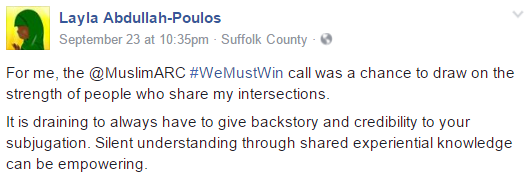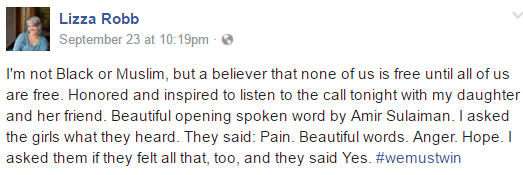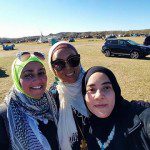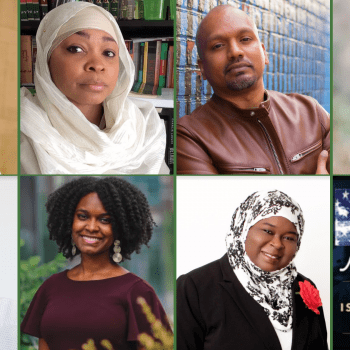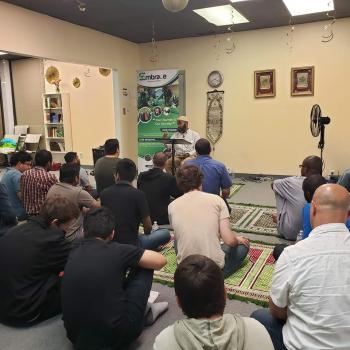By Layla Abdullah-Poulos
On 9/23/16, the Muslim Anti-Racism Collaboration and Sapelo Square co-sponsored the #WeMustWin national call. Organized by Margari Hill and Su’ad Abdul Khabeer, the main purpose of the call was to create a space for Muslims to discuss the Movement for Black Lives after the recent deaths of Terence Crutcher and Keith Lamont Scott by law enforcement, which is part of a disturbing trend of loss of lives in Black communities.
The #WeMustWin national call comprised of a spectrum of Muslim leaders from across the country, including:
Imam Johari Abdul Malik, Dar Al Hijrah (Virginia)
Kalia Abiade, Center for New Community (Chicago)
Minister Carlos Muhammad, Nation of Islam (Baltimore)
Kameelah Mu’min Rashad, Muslim Wellness Foundation, Inc.- (Philadelphia)
Amir Sulaiman, Poet, recording artist, activist (Oakland, CA)
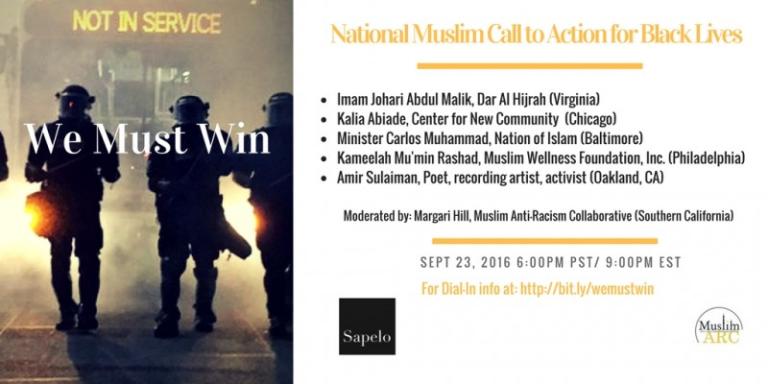
The panel represented a cross-section of Black Muslim activism in the arts, chaplaincy, advocacy, and health and wellness. Organizers afforeded each panelist time to talk about Muslim responses to instances of injustice and multiple ways to engage in everyday resistance. There was also discussion about the importance of self-care in activism and with constant exposure to the multiple images of oppression.
All of the speakers were inspiring, motivating and empowering while addressing issues pertinent to the lives of NbA Black Muslims, who frequently find their voices and concerns dampened in American Muslim communities.
We Must Win
Amir Sulaiman read his poem, We Must Win, which inspired the name of the hashtag. Sulaiman’s poem lyrically laid before listeners the disgraceful continuum of degradation and decimation to which African American bodies have been subjected throughout the country’s history.
“Every people has been sent an author to tell their story. This is a tale of what turns a man into a monster and what turns that monster into a martyr and a shadow of untold trauma.”
As Sulaiman spoke his words, the reality of our dehumanization resounded from the phone and into the air.
“We’re just trying to make Black history, but it’s like they want to make Blacks history and won’t even write a Eulogy for you and me.”
Sulaiman served listeners with a reminder that for millions of Muslims in America, their skin color places them at a precarious precipice of race and that a victorious struggle is the only way to stave off annihilation.
Turn Tragedy into Triumph
Imam Johari Abdul Malik advised on strategies to empower Black Muslims and the broader community against racism and oppression. He encouraged an assessment of the multiple engagement approaches such as nonviolent resistance, civil disobedience, town hall meetings, leadership training and rapid response plans, which are essential to productively addressing instances of racial injustice.
“That would mean establishing teachers, ones that would talk about the history of our movements and to get people to understand the psychology of engaging in civil disobedience and nonviolent action [and] move from being afraid to being empowered.”
Imam Johari also asserted the need for seeing beyond particular incidents of injustice to appreciate the need to acquire more socio-political power. Drawing on Islamic history, he provided a clear outline for Muslims to organize and respond.
“There is a difference between revolution and revolt. The essential difference is that revolutions are organized and revolts are not. That means understanding our historical victories. The incident at Hudhabiyyah and the treaty that the Prophet (SAWS) negotiated was a nonviolent victory. [The conquest at] Mecca was a nonviolent victory. The Muslims had been able to identify allies [and] strategies, and in an environment where they were nonviolent, they could express their concepts and ideas that would allow them to organize.”
“In the context of organizing, the issue is not about the particular incident; it is about building power in that community. The important element is to use the tragedy to create triumph in our community.”
Muslims Must Unite
Minister Carlos Muhammad fortified the idea of maintaining connections to the community when fighting injustice.
“One of the things we ran into as members of the Nation of Islam is that naturally, the Nation of Islam has had a history of being connected to the community and serving the people that may be considered non-Muslim. So when we took to the streets, we took to the streets, not because of the situation itself but because we understood that this was our city, and our city was in a situation that could have really gone bad. We were united and organized together.”
Minister Muhammad also talked about the need for Muslim unity.
“As Muslims, we already have a call to order. Allah says, ‘Oh you who believe, stand out firmly for justice as witnesses to Allah’ [4:135]. So when we see injustices taking place across the country, we should really be the first people out there. [Our Prophet] always stood up against injustice, whether it is Muslims or non-Muslims. Thus, Muslims in the Muslim communities in these cities must be united.
The first thing we have to do is follow the commandment of Allah (SWT) in the Quran when he is telling us to set aright our differences. But if we’re arguing over the pettiness of views on Quran and hadith, then when injustices are in our cities and near our masaajid or just in where we live, then we will find it very difficult to affect change.”
Racism, Injustice and Psychological Trauma
Kameelah Mu’min Rashad stressed the importance of addressing the psychological and emotional impact of exposure to racism, and injustice as well as the engaging in the draining work of activism.
“We are impacted by both by anti-racism and anti-Muslim bigotry. We are deeply wounded by the deaths of Black people, and we are also hypervigilant as it relates to the rise of hate crimes against Muslims across the country. With that vigilance and strength in the face of these assaults, it takes an emotional and psychological toll that we don’t often acknowledge, recognize, or know how to address.”
Rashad explained the toll that unaddressed trauma may have on the individual and the significance of drawing strength from Islam and the Black experience.
“Unfortunately, it will manifest itself in self-destructive ways. We will experience anger, rage, confusion, doubt, irritability, even at times a diminished sense of wondering whether or not we are still under Allah’s (SWT) protection and mercy.
I encourage everyone to experience those ranges of emotions. The minute we limit our right to do that, it also diminishes our humanity.
We can organize, we address some of the internal divisions within the Muslim community that impede our progress, but at the core of that is acknowledging the ways in which we are emotionally impacted.
We have to be able to develop a level of emotional literacy and safety in being able to express how vulnerable and angry we may feel.
We draw from the strength of our cultural background. We are strong people; we have dealt with hundreds of years of oppression, and we draw from our spiritual legacy. We only place our trust in Allah (SWT).”
Rashad conveyed to listeners to the importance of Black Muslims developing self-care to address the psychological trauma of racism as well as the need for non-Black Muslims to appreciate the influence of the intersection of race on their fellow Black Muslim experiences.
Multifaceted Activism
Kalia Abiade described the various approaches to activism in which Muslims may engage.
“Across the country, people are pouring their energy into different forms of activism. We got the elections six weeks away; many people are working on that. There is law enforcement accountability work, media engagement, people working on school bullying curriculum, opposition to mosque construction and Countering Violent Extremism programs that are using social service programs to target our young people. There are also organic programs healing circles, community forums and town halls.
All of this plays a really important role, and there is something for everyone in there.”
Although she did mention efforts for predominantly non-Black Muslim organizations to explore the intersections of race and religion for Black Muslims and how it impacts their work, Abaide told call listeners that there is still need to highlight Black Muslim voices in American Muslim culture.
“There is still a lot of space to create Black Muslim voices and perspectives. We don’t have to wait for anyone else to make that space for us. It’s not just so that we can be seen, or so our voices can be heard; we can contribute to the creation of solutions for many of the social issues that are really urgent and pressing right now. That includes national security and policing, but it also exceeds those issues. Therefore, it is really important that we are not afraid to create that space, we are unapologetic about it, and that we insert ourselves into this conversation.”
A Q&A session followed the presentations.
Immediate Impact
After the call, listeners took to social media to share their appreciation for the #WeMustWin national call and share how it affected them.
Many NbA Black Muslims (including me) attested that the call helped to strengthen their deflated spirits.
The call also received accolades from non-Black Muslims and non-Muslims.
Black Muslim Voices
The need for spaces where Black Muslims have a platform to assert their perspectives is essential to forming a strong American Muslim presence in the social justice sphere and alleviating the national and intra-cultural racism that causes so much psychological and emotional damage. The ability to congregate, strategize, organize, and provide solutions to social issues will not only contribute to the empowerment of Black Muslims but to non-Black Muslims and the broader society and make the United States a truly egalitarian nation.



